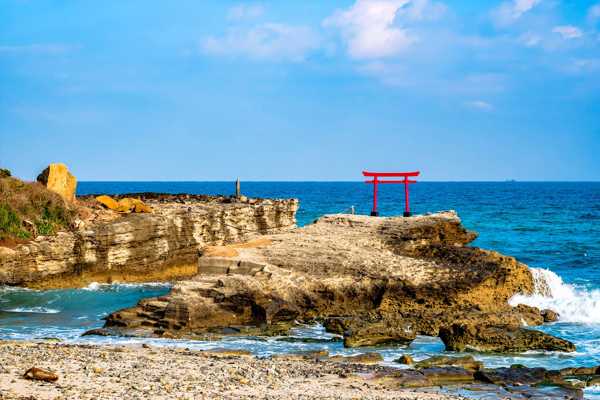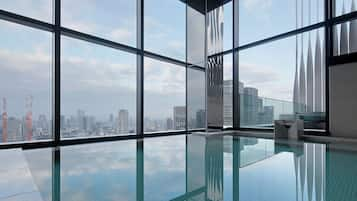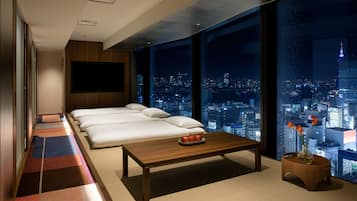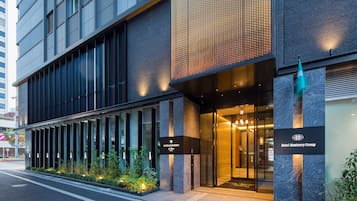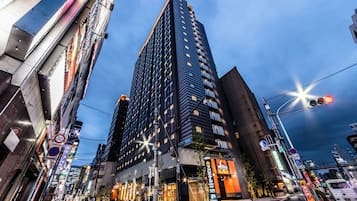The best things to do in Japan showcase its uniquely rich history and a reverence of things past, combined with a forward-looking approach to technology, IT and architectural design. From ancient temples to some of the tallest, most modern buildings in the world, this land of contrasts will leave you in awe.
Tokyo’s Shinjuku Station, with its 2 million passengers a day, and its surrounding neighbourhood deserve thorough exploration, and the swanky Ginza District is also unique in itself. As for culture, Japan and its Buddhist temples and Shinto shrines are justly world famous. Enjoy this remarkable nation to the most and read up on Japan's top destinations.
What are the best things to do in Japan?
- 1
Sensoji
Tokyo's oldest Buddhist temple
- Histoire
- Photographie
Afficher plus d’infosWhen in Asakusa, visit the popular Buddhist temple, Sensoji (Asakusa Kannon Temple), which is the oldest in Tokyo and one of the most impressive. Many tourists associate it with the large red lantern hanging at one of its gates with engraved characters saying 'Kaminari-mon' or 'Thundergate'.
It's estimated that more than 30 million devotees flock here every year. The temple is dedicated to Guan Yin, the goddess of mercy. Legend has it that Sensoji was built in 645 for the goddess of Kannon. Another well-known structure at Sensoji is a 5-tiered pagoda that was built in 1649.
Emplacement : 2 Chome-3-1 Asakusa, Taito City, Tokyo 111-0032, Japan
Ouverture : Main hall opening hours vary by season. The temple grounds are always open.
Téléphone : +81 (0)33-842-0181
Carte - 2
Kinkakuji (The Golden Pavilion)
One of the most iconic attractions in the whole country
- Histoire
- Photographie
Afficher plus d’infosKinkakuji Temple is one of the most visited attractions of Kyoto. Literally meaning 'Temple of the Golden Pavilion', this Zen Buddhist shrine is a UNESCO World Heritage Site. It’s a breathtaking piece of architecture and is surrounded by a Japanese-style garden.
Known by many as Rokuonji or the Deer Garden Temple, Kinkakuji was built in 1397 as a retirement pavilion for Shogun Yoshimitsu Ashikaga (1358-1409). The Golden Pavilion has 3 floors and stands 12.8 metres tall. Both the second and third floors are gilded with gold-leaf on Japanese lacquer, giving it such a unique appearance. Don’t miss the traditional tea room within the temple grounds.
Emplacement : 1 Kinkakujicho, Kita Ward, Kyoto 603-8361, Japan
Ouverture : Daily from 9 am to 5 pm
Téléphone : +81 (0)75-461-0133
Carte - 3
Kiyomizu-dera
Majestic views from the platform
- Familles
- Histoire
- Photographie
Afficher plus d’infosA visit to Kiyomizu-dera in the wooded hills east of Kyoto is like travelling back in time. This 'Pure Water Temple' is a UNESCO World Heritage Site and one of Japan’s most celebrated temples. Kiyomizu Temple is best known for its 13-metre-high wooden platform that juts out from the main hall.
The platform affords visitors great views out over the numerous maple and cherry blossom trees below that burst into a bright sea of colour in spring and autumn. It also has panoramic views of Kyoto city centre in the distance. The main hall was built without the use of nails and houses the temple's primary object of worship: a small statue of the 11-faced, 1,000-armed Kannon.
Emplacement : 1 Chome-294 Kiyomizu, Higashiyama Ward, Kyoto 605-0862, Japan
Ouverture : Hours vary by season
Téléphone : +81 (0)75-551-1234
Carte - 4
Shinjuku district in Tokyo
One of Tokyo’s most bustling districts

- Gastronomie
- Photographie
- Shopping
The Shinjuku district in Tokyo, particularly Shinjuku Station, provides a truly surreal experience. With more than 2 million passengers passing through the station each day, it’s a constant sea of people busily heading to work in the towering skyscrapers that dominate the skyline above street level.
Shinjuku offers a little bit of everything, from bustling shopping centres and entertainment venues to serene parks and cultural sites. As one of Tokyo’s most diverse and vibrant centres, Shinjuku warrants a visit at any time of day or night.
Carte - 5
Horyuji Temple
Japan's oldest Buddhist temple
- Histoire
- Photographie
- Insolite
Afficher plus d’infosHoryuji Temple, founded by Prince Regent Shotoku (574-622), is considered Japan’s oldest Buddhist Temple and the world's oldest existing wooden structure. Horyuji Temple features an original wooden kondo (main hall) that's more than 1,300 years old, a 5-tiered pagoda and many valuable Buddha images and sculptures.
Besides being one of the 7 great temples of the prefecture and the seat of the Shotoku sect of Buddhism, Horyuji Temple is credited to be the first UNESCO World Heritage Site in Japan.
Emplacement : 1-1 Horyuji Sannai, Ikaruga, Ikoma District, Nara 636-0115, Japan
Ouverture : Hours vary by season
Téléphone : +81 (0)74-575-2555
Carte - 6
Nikko National Park
Rugged beauty and thrilling outdoor activities
- Aventure
- Familles
- Photographie
Afficher plus d’infosCovering 1,407 sq km, Nikko National Park is one of the most beautiful and most visited regions in Japan. It features wide moorland, waterfalls and lakes, forests that reach back in time as well as impressive mountains, such as Mount Okushirane, Mount Nantai, Mount Nasu and Mount Hiuchi.
The park has a number of spas that feature a plentiful supply of hot mineral water and are extremely popular with visitors. People flock to the park for its rugged beauty and to enjoy outdoor pursuits like mountain climbing, hiking, camping, boating, fishing, skiing and skating.
Emplacement : Yumoto, Nikko, Tochigi 321-1662, Japan
Carte - 7
Ginza district in Tokyo
A glamorous shopping district

- Luxe
- Photographie
- Shopping
Named after a silver coin minted in 1612, Ginza district in Tokyo has the reputation of being one of the world’s most extravagant and luxurious shopping districts. Legendary stories of extraordinarily priced apples and the world’s most expensive cup of coffee emanate from Ginza.
Amidst the glamour of Ginza stand a number of traditional Japanese theatres and the world’s first capsule apartment building. The best time to visit is at weekends when the main roads are closed to traffic and the promenade opens up as a walking street lined with the riches of commercial Japan.
Carte - 8
Himeji Castle
A supreme example of craftsmanship and innovative design
- Familles
- Histoire
- Photographie
Afficher plus d’infosUnlike many other Japanese castles, Himeji Castle was never destroyed in wars, earthquakes or fires and survives in its original form. It’s both a national treasure and a UNESCO world heritage site. The best-preserved castle in all of Japan, it serves as a classic example of Japanese castle architecture, having been designated a national treasure in the early 1930s.
Each spring, locals and visitors flock to its grounds to admire the cherry blossoms, picnic and immerse themselves in the enchanting surroundings.
Emplacement : 68 Honmachi, Himeji, Hyogo 670-0012, Japan
Ouverture : Daily from 9 am to 5 pm
Téléphone : +81 (0)79-285-1146
Carte - 9
Itsukushima Shrine
Home of the famous 'floating' torii gate
- Histoire
- Photographie
- Insolite
Afficher plus d’infosOne of Japan’s '3 Great Sights', Itsukushima Shrine is otherwise known as Miyajima, which means 'Shrine Island' in Japanese. The shrine is well known worldwide for its 'floating' torii gate as, at high tide, it appears to be unattached to the land whereas at low tide people can actually walk out to it.
The shrine complex consists of several buildings, including a prayer hall, main hall and a noh theatre stage, which are connected to each other by boardwalks and are all supported by underwater pillars. The shrine itself is situated in a small inlet, while the torii gate is set further out in the Seto Inland Sea.
Emplacement : 1-1 Miyajimacho, Hatsukaichi, Hiroshima 739-0588, Japan
Ouverture : Hours vary by season
Téléphone : +81 (0)82-944-2020
Carte - 10
Minato Mirai
Yokohama’s futuristic waterfront

- Familles
- Photographie
- Shopping
Minato Mirai 21, meaning 'Harbour of the Future', is a vibrant seaside urban development in Yokohama that epitomises modernity and innovation. This area features many futuristic buildings, including one of Japan’s tallest buildings, the 296-metre-tall Landmark Tower.
Visitors will be delighted by the wide array of attractions available, such as sprawling shopping centres, luxury hotels, a convention centre, an amusement park, various museums and a relaxation centre with hot spring baths. Minato Mirai offers an incredible range of leisure activities for the whole family.
Emplacement : Minatomirai, Nishi Ward, Yokohama, Kanagawa 220-0012, Japan
Carte - 11
Kobe Chinatown
History and culinary delights

- Gastronomie
- Photographie
- Shopping
In the late 1800s, while Western settlers were building homes up in Kitano-Cho, Chinese merchants set up shop in a two-block area now known as Nankin-machi, or Chinatown. Today, its Chinese flavour remains in this tightly-packed, vibrant area filled with streetside vendors selling snacks and souvenirs. At its central square in Nankin Park, animal statues represent each of the 12 years of the Chinese astrological calendar.
Public restrooms are not usually something to note, but the one in Chinatown, called Garyoden, or 'palace of a secluded wise man', has an outer wall that is spectacularly designed with dragons. Chinatown is also a great place to find a good, reasonably priced meal.
Cartephoto de Marufish (CC BY-SA 2.0) modifiée



